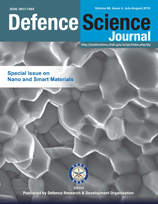High Sensitive Electrical Metamaterial Sensor for Fuel Adulteration Detection
DOI:
https://doi.org/10.14429/dsj.66.10217Keywords:
Electrical metamaterials, complementary split ring resonator, adulteration, flex fuel sensorsAbstract
Life of any automobile engine is largely dependent on the purity as well as the optimum ratios of their fuels, viz. petrol, diesel and ethanol. A device working on the electrical metamaterial concept, namely a complementary split ring resonator (CSRR), operating at 2.47 GHz (ISM band), is proposed to detect kerosene adulteration in petrol. Kerosene was varied upto 30 per cent with minimum detection limit as low as 10 per cent. Systematic shifts in the transmission resonance frequency were observed. The sensing was fast and the recovery was instantaneous. The underlying concept of interference of electromagnetic radiation through the CSRR circuit and its further manipulation with the changes in the dielectric ambience is elaborated.Downloads
Published
2016-06-28
How to Cite
Rawat, V., Nadkarni, V., & Kale, S. (2016). High Sensitive Electrical Metamaterial Sensor for Fuel Adulteration Detection. Defence Science Journal, 66(4), 421–424. https://doi.org/10.14429/dsj.66.10217
Issue
Section
Research Papers
License
 Where otherwise noted, the Articles on this site are licensed under Creative Commons License: CC Attribution-Noncommercial-No Derivative Works 2.5 India
Where otherwise noted, the Articles on this site are licensed under Creative Commons License: CC Attribution-Noncommercial-No Derivative Works 2.5 India


